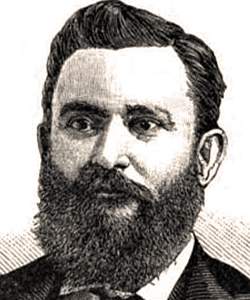William Calvin Oates (Congressional Biographical Directory)
Reference
OATES, William Calvin, a Representative from Alabama; born at Oates Cross Roads, near Troy, Pike County, Ala., November 30, 1835; pursued elementary studies at home and attended an academy at Lawrenceville, Ala.; studied law; was admitted to the bar in 1858 and practiced in Abbeville, Ala., from 1859 to 1861; during the Civil War entered the Confederate Army as captain of Company G, Fifteenth Regiment, Alabama Infantry, in July 1861; appointed colonel in the Provisional Army of the Confederacy May 1, 1863; resumed the practice of law in Abbeville in 1865; delegate to the Democratic National Convention in 1868; member of the State house of representatives 1870-1872; unsuccessful candidate for the nomination for Governor in 1872; member of the State constitutional convention in 1875; elected as a Democrat to the Forty-seventh and to the six succeeding Congresses and served from March 4, 1881, until November 5, 1894, when he resigned, having been elected Governor; chairman, Committee on Revision of the Laws (Forty-eighth through Fiftieth Congresses), Committee on Expenditures in the Post Office Department (Fifty-second and Fifty-third Congresses); unsuccessful candidate for the United States Senate in 1897; Governor of Alabama 1894-1896; brigadier general of Volunteers in the Spanish-American War and stationed at Camp Meade, Pa.; resumed the practice of law; died in Montgomery, Ala., September 9, 1910; interment in Oakwood Cemetery.
“Oates, William Calvin,” Biographical Directory of the United States Congress, 1774 to Present, http://bioguide.congress.gov/scripts/biodisplay.pl?index=O000005.
William Calvin Oates, Fifteenth Alabama (American National Biography)
Scholarship
Oates was given command of the Fifteenth Alabama in the spring of 1863. His commission as a full colonel was delivered to Lee, but for reasons not known it was never confirmed by the Confederate Congress, which meant that technically Oates never achieved a rank higher than lieutenant colonel.... Nevertheless, the Fifteenth Alabama held Oates's loyalty and fondness, for, as he declared later in his life, "there was no better regiment in the Confederate army." At Gettysburg, on 2 July 1863, Oates was in command of his regiment for the first time in battle. On the slopes of Little Round Top, Oates and his Alabamians tried to dislodge the Union defenders of the hill, the Twentieth Maine Regiment under the command of Colonel Joshua Lawrence Chamberlain. After an hour of desperate fighting, some of it in hand-to-hand combat, Chamberlain led his troops in a bold bayonet charge that swept Oates's Confederates from the hillside. "We ran," Oates later confessed, "like a herd of wild cattle." In the rush of retreat, he had to leave behind his brother John, who had been mortally wounded in the fighting.
Glenn W. LaFantasie, "Oates, William Calvin," American National Biography Online, February 2000, http://www.anb.org/articles/05/05-00576.html.





